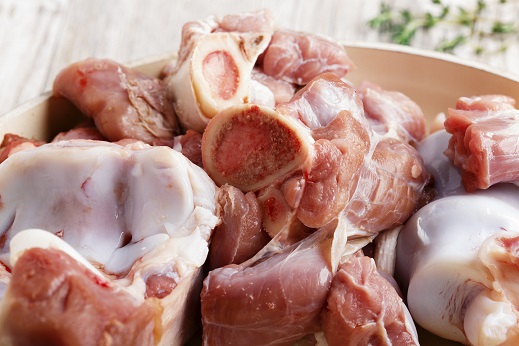 Collagen is the most abundant protein in all of nature, and makes up over 30% of protein in the human body.
Collagen is the most abundant protein in all of nature, and makes up over 30% of protein in the human body.
It’s the main structural protein in the skin, hair, nails – even the connective tissues that anchor the teeth to your gums.
Your heart needs collagen to beat efficiently, and the cornea and lens of your eyes are comprised partly of collagen. Basically, this protein is vital for your health…
…and it’s particularly vital for acne-free skin. Consider ageing – until age 25, around 80% of your skin is collagen, but afterwards, levels fall by roughly 1% each year. That’s why wrinkles appear, why elasticity is lost, and why the skin thins.
With no collagen at all, your skin would just fall apart. Collagen provides the “scaffolding” around which almost all new cells are constructed.
Collagen supercharges the healing of old acne
 Such an important protein is clearly a contender to help acne, and collagen does that well.
Such an important protein is clearly a contender to help acne, and collagen does that well.
Firstly, collagen is the complete opposite to keratin, another skin protein. Keratin overgrowth is the second biggest cause of clogged skin pores, whereas collagen is beneficial: it massively accelerates the healing of your dying pimples.
Read Annihilate Your Acne – get the ultimate diet and clear your acne permanently!
Simply put, collagen is the single most important protein for wound healing. If you cut your arm open, then 10 hours later, your immune system fibroblasts start to churn out copious amounts of collagen.
This creates a cellular matrix, or a scaffolding, to which other structural proteins attach, including more collagen itself, but also immune system chemicals with anti-inflammatory and antibacterial powers. They use the collagen mass as a sort of hub, a base from which they are sent forth to fix your wound.
Three weeks later, this type 3 collagen is replaced with the significantly stronger type 1 collagen. Then the recovery begins in earnest. The wound is sealed, infections are stamped out, and now, collagen is continually laid down to strengthen the skin back to normalcy.
Collagen is critical for all kinds of wounds, whether a bullet wound, a piece of shrapnel or a papercut. That applies to your acne in full force.
If your immune system attacks p.acnes bacteria with too much power, the root cause of all acne, then this spills into the surrounding tissues, particularly the lower layers of skin. They have to be repaired, and again, collagen lays down the structural matrix.
Likewise, any pimple that you hack and pop becomes a clear breach of the skin, one that needs to be healed like any cut.
Why bread and pasta are a massive cause of acne
With more collagen, neutrophils designed to break down useless tissue won’t get out of hand. Anti-inflammatory immune system chemicals will have far superior coordination. Acne scabs will heal faster and acne marks will fade faster.
Basically, your old pimples won’t hang around; the healing will become far more efficient.
That’s why collagen is so vital for clear skin. By increasing your production, you’ll enjoy far less acne at any given time.
Have you ever had a particularly vicious and inflamed pimple which gave you grief and pain for several days, before giving you a further poke in the eye by hanging around for weeks afterwards? Great news – collagen can move along such monstrosities.
It doesn’t end there – collagen can strengthen your entire skin’s structure. These days, we are exposed to a soup of acne-causing environmental toxins, including air pollution from cars and factories, cosmetics like shampoo and makeup and even polluted tap water. These villains can damage your skin by generating free radicals and creating squalene peroxide, and also directly inflaming existing acne upon contact.
Recommended – the top 6 vitamins and minerals for acne-free skin
There’s many great ways to avoid environmental chemicals, like using natural cosmetics, but the reality is that you’ll always be exposed to some. Heavy metals like mercury and arsenic, for example, have a half-life of hundreds of years; that goes for your house and neighbourhood.
Therefore, it’s vital for all acne patients to strengthen the skin itself, and collagen is a terrific way to achieve that. Collagen is therefore particularly useful if you live in a polluted area or can’t afford natural, chemical-free personal care products.
Collagen makes your skin bulletproof
Collagen also specialises in UV radiation protection. Unfortunately, the sun is an expert in skin cancer, sunburn, and indeed acne, again by mutating skin cells and creating free radicals. However, you also need UV light to make vitamin D, a critical nutrient for lowering inflammation and preventing insulin resistance.
And realistically, you can’t just avoid sunlight all your life, and neither would you want to. Getting a tan, surfing and sunbathing at the beach, and even going to waterpark would all be forbidden for acne.
Which makes this study very pleasurable reading: mice were given small amounts of a collagen peptide, and within 6 weeks, they gained resistance to skin hydration decreases and hyperplasia (proliferation) caused by intense sunlight. The scientists concluded that “collagen peptide is beneficial as a dietary supplement to suppress UV-B-induced skin damage and photoaging”.
The top 7 topical treatments for clearing acne naturally
Additionally, elderly people are notoriously more prone to skin cancer, and the fall in collagen after age 25 is one reason why. You too can benefit, either with the same special peptide, eating more dietary protein or getting amino acids like lysine. You’ll be able to enjoy the sun, and make more vitamin D (full article here) without worrying about new acne being born.
333mg of the peptide above boosted skin hydration by 65.8%, which will work wonders for the tone of your skin.
The ultimate collagen strategy for acne
For all those reasons, boosting collagen levels can work wonders for your acne.
Your body might not be manufacturing enough for your health needs, let alone cosmetic. Many members of Western civilisation could do with more collagen, possibly including you.
So here are the three cornerstone strategies…
Protein intake – collagen is a protein and as such, is synthesised from protein. Chicken and steak remain incredibly popular – protein intakes aren’t criminally low, although there is a large movement in health and fitness circles to high-protein diets for accelerating the metabolism (which does work).
Why using raw honey could revolutionise your skin
The problem is our range of protein. In traditional hunter gatherer societies, the whole animal was eaten, with generous helpings of connective tissues and organ meats like liver.
Even the bones were ground down and their tissues extracted and eaten. We were starving back then, and ate whatever straggles of meat were available.
Consequently, we fed ourselves a wide variety of amino acids. With the dominance of muscle meat today, our bodies are overloaded with tryptophan and cysteine, at the expense of proline and glycine…
…and you guessed it: these amino acids are needed in the very first step of collagen production. We eat enough protein overall, but it’s not ideal for collagen production. That’s partly why weak skin is more common than we’d like.
The acne solution – eat a wider variety of protein. Of the traditional meats, pork is higher in glycine than others.
Chicken legs are decent, because the skins are precisely the sort of connective tissue where glycine and proline accumulate (partly because it’s skin, and contains plenty of collagen itself). There’s also liver and kidneys, or bone broth, if you eat those foods anyway.
But the best solution is easily this Great Lakes Pasture Raised Gelatin (amazon link). Gelatin is a dense source of a cow’s connective muscle tissues, ground down into a jelly. Gelatin supplements are specifically designed to increase collagen, and they do that well, because the amino acid composition is 27% glycine and 15% proline.
Why dairy can either destroy your skin or improve it
Moreover, this great Lakes Brand is grass-fed, and will contain other acne nutrients like magnesium, zinc (terrific for acne) and healthy omega 3 fats. It’s a multifaced acne clearer.
You can consume a tablespoon on its own, or add the gelatin to meat, homemade baking, or any other recipe calling for jelly. This brand easily beats the additive laden gelatin sourced from pigs raised in crowded and unhealthy CAFO facilities.
Increase your vitamin C intake
To make collagen, proline and glycine are first assembled into procollagen (a precursor), which is then catalysed by two hydroxylase enzymes in a reaction with proline and also lysine (amino acids). This is the stage that forms collagen itself, and vitamin C is critical. It serves as a cofactor for the two enzymes; they cannot function without it.
Hence, a dodgy diet can severely impair your collagen production, because the body itself cannot manufacture vitamin C.
Witness the disease of scurvy, the arch enemy of 17th century sailors everywhere. It started with lethargy and lacklustre energy, progressed to bleeding gums, weak joints and strange spots on the skin, and ended with death, as the blood vessels collapsed and haemorrhaged.
Eventually, scientists noticed that boats carrying citrus fruits were mysteriously immune. The solution was clear. From that day forth, all British Empire vessels were supplied with crates of oranges. When vitamin C was discovered in the 1930s, it became clear that scurvy was just an extreme form of deficiency.
Vitamin E – the ultimate nutrient for clogged pores
But what never became famous is the specific process involved – that without vitamin C, your body cannot make collagen. Teeth dropping out, strange blotches on the skin, and an irregular heartbeat are all caused by steadily weakening connective tissues. Likewise for the fatal collapse of blood vessels.
Vitamin C is vital for proper collagen production, but for two reasons, many acne patients don’t get enough.
Firstly, the quantity of vitamin C in fresh fruit and vegetables has dropped substantially over recent years. A Kushi Institute study analysed 12 different fruits and vegetables and found a 30% fall in vitamin C content in just 22 years, from 1975 to 1997. The story almost certainly didn’t end there. Conventional farming seems to be involved, as studies on organic strawberries found a 10% higher vitamin C content than organic ones.
Secondly, parents force their kids to eat green vegetables much less now. Pizzas and ready meals have stepped in, and these habits last into adulthood.
The acne solution – eat green vegetables, berries like strawberries and raspberries, bell peppers, and tomatoes. Get your carbohydrates from white potatoes, which contain 20mg (33% of the RDA) per 100 grams. You can easily fulfil your skin’s collagen needs through diet.
However, to take things to the next level, you can megadose by taking raw camu camu powder. The camu camu berry, hailing from the jungles of Peru, is the single richest source of vitamin C in the world. The powder is a dried and highly condensed version, and by mixing 5 grams into a glass of water, you can obtain roughly 800% of the RDA. I used to take 5 grams or more daily. A pure and officially organic brand is Terrasoul Superfoods (amazon link).
Alternatively, if you dislike the taste or are too busy stir it into water and drink, you can take a good old fashioned miracle pill. My current brand is this Garden of Life Raw Vitamin C (amazon link).
This bottle is food-derived and thus well-absorbed, organic, still fairly cheap, and contains 500mg of vitamin C per pill. That’s 833% of the RDA, and remember that vitamin C is one of the few nutrients with megadosing potential.
Avoid cigarettes and environmental pollutants
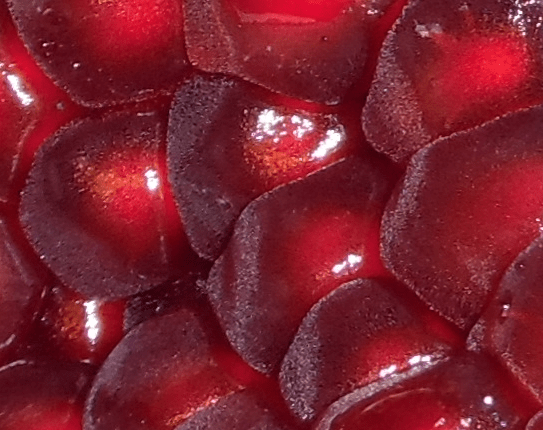 Cigarettes are bursting with acne-causing chemicals. Tobacco, tar, pesticides, chemical weapons, rat poison – many can damage both the production of collagen and the structure of existing collagen.
Cigarettes are bursting with acne-causing chemicals. Tobacco, tar, pesticides, chemical weapons, rat poison – many can damage both the production of collagen and the structure of existing collagen.
- This study applied a cigarette smoke extract to collagen cells, and watched as the collagen began to deteriorate. Patients with chronic obstructive pulmonary disease were also given the dreaded extract, and their collagen levels suffered. The scientists blamed an increase in inflammatory immune system chemicals called neutrophils, which generate free radicals. Worse, the breakdown of collagen triggered further neutrophil activity, creating a self-perpetuating cycle of ever greater tissue damage.
It’s not known how smoking achieve this. The average cigarette contains roughly 3500 different chemicals like nickel, carbon monoxide, and cyanide, so it could be anything. Collagen depletion is one reason why smokers age so quickly.
The acne solution – quit smoking and minimise your intake if you can’t.
Other acne-causing contaminants are similarly deadly. Mercury inhibited the entire synthesis of collagen in this study. While copper prevented the hydroxylase enzymes from converting the procollagen, mercury inhibited every step of the process, beginning at the assembly of glycine and proline.
Because it has a particularly high affinity for collagen’s molecular structure, mercury can even attach to present collagen in your body, and twist it into an ineffective form.
Read Annihilate Your Acne – learn why mercury might be damaging your skin
Worse, your body does not recognise this mutated protein, and launches an inflammatory assault against it. Systematic inflammation rises, and ultimately, so does acne. Mercury has a half-life of 444 years, and accumulates in the body.
The acne solution – first and foremost, boost your selenium levels. This mineral binds to mercury, and prevents mercury from binding to bodily cells. The mercury is thus easily removed from the bloodstream. Furthermore, selenium cures acne in other ways, like manufacturing the all-important antioxidant glutathione. Selenium can easily be obtained by eating two Brazil nuts per day. Terrasoul Superfoods is an excellent brand, while Pure Encapsulations Selenium is perfect for an isolated and well-absorbed pill.
Secondly, our oceans are polluted with mercury and so are the largest fish, because they’re high in the food chain and eat all the smaller fish containing mercury. Therefore, you should avoid tuna, king mackerel (not Atlantic mackerel), and shark.
Aluminum can also bind to the molecular structure of collagen. This study applied aluminum to rats, fibroblast cultures and chick embryos and discovered that collagen synthesis was inhibited in every tissue. Cadmium, a popular pesticide in the 1950s which is now banned, can also degrade collagen in this way.
In fact, disrupting collagen formation is surprisingly common to many environmental toxins. In my eBook Annihilate Your Acne, there’s a 10 page chapter on how to avoid these hidden villains. A good start is to buy organic foods and natural personal care products.
The topical treatments
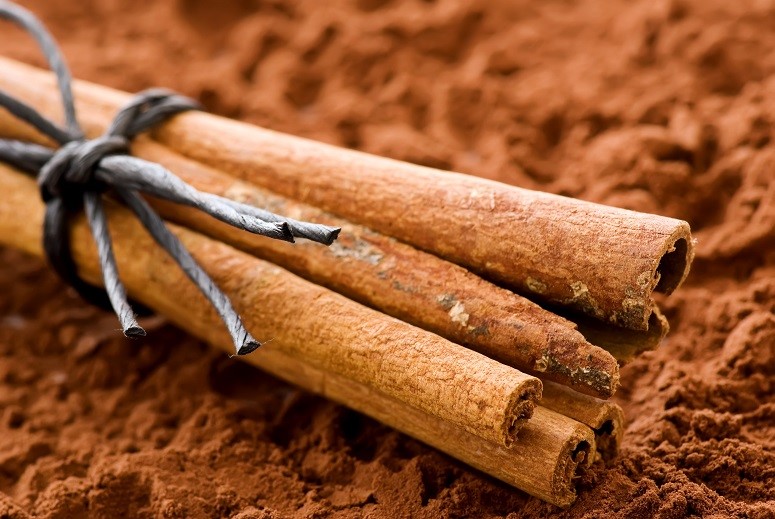 Complimenting the basic nutrition for collagen production, you have the topical treatments which increase levels more mysteriously.
Complimenting the basic nutrition for collagen production, you have the topical treatments which increase levels more mysteriously.
Applying collagen itself is actually one of the least effective strategies. Found on beaches in Indonesia, tree barks from India, or curries eaten worldwide, are compounds which either boost collagen production or protect it from destruction.
Cinnamon – a highly unexpected collagen booster. The everyday cinnamon powder sprinkled into dessert or coffee boosted collagen superbly in this topical study from 2012, which concluded that “cinnamon extract is useful in antiaging treatment of skin“.
Cinnamon contains a compound called cinnamaldehyde, also responsible for the flavour, which stimulates IGF-1 activity when applied to the skin. Among various other growth factors, this hormone controls collagen production.
Tamanu oil – the oil of the tamanu fruit growing on sandy beaches in Oceania. Polynesians use it daily, but few acne patients are aware, and the lucky few probably still don’t know about the amazing collagen-boosting properties.
In one study, tamanu oil was applied to healing wounds, stimulating a 40% increase in collagen levels after 24 hours. As a bonus, tamanu oil wipes out p.acnes bacteria effectively.
Lavender oil – an essential oil (rather than a fat-based oil) derived from the petals of the lavender flower. Lavender oil succeeds by activating protein-transforming factor beta in the skin, a regulator which controls collagen formation. In studies, lavender oil increased collagen formation after 4 days, and produced the expected benefits: faster wound healing and reduced wound size.
Vitamin C – consuming vitamin C will always be most important here, but topical vitamin C has also increased local collagen production in studies. As an antioxidant, it could also protect existing collagen from degrading.
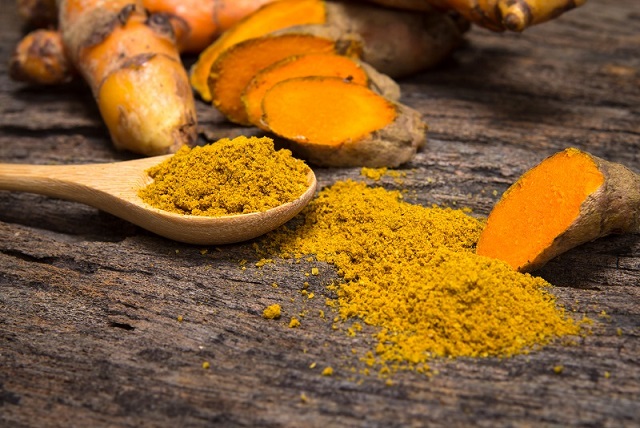 Turmeric – this spice can accomplish almost anything for acne: antioxidants, lowering inflammation, lowering oily skin when applied topically (although not as strongly as green tea). Boosting collagen is just another day, since curcumin (turmeric’s signature compound) can increase not just collagen formation, but also its strength, improving the viscosity, density, and heat resistance.
Turmeric – this spice can accomplish almost anything for acne: antioxidants, lowering inflammation, lowering oily skin when applied topically (although not as strongly as green tea). Boosting collagen is just another day, since curcumin (turmeric’s signature compound) can increase not just collagen formation, but also its strength, improving the viscosity, density, and heat resistance.
Aloe vera – the gel contains numerous natural compounds: giberrellin, lupeol, and glucomannan. All can increase type 1 collagen production through various pathways, including binding to growth receptors on your skin and stimulating them. One amazing study showed cells exposed to aloe vera rapidly becoming twice as concentrated in collagen as usual.
Possibly avocado oil – only a potential weapon for now. The studies are promising yet clouded. Avocado oil has been shown to increase collagen levels, but only in rat skin. It also may inhibit the enzyme lysinase, which breaks down lysine, one of the key amino acids in collagen, but only in one oral study. Furthermore, avocado oil is high in irritating oleic acid, so if you wish to experiment, you should dilute it, perhaps with tamanu oil.
Possibly neem – another unproven remedy, but one with less side effects. The neem tree is native to India and Pakistan. Its leaves and oil are popular in ancient Indian medicine, and now modern acne experimentation. Neem leaf extract can apparently inhibit matrix metallo proteinase (MMP) enzymes, which degrade and recycle existing collagen.
The problem? That was only one study, on one of the skin’s enzymes. Neem has never been shown to increase collagen itself, but the potential remains.
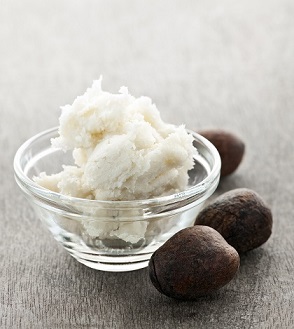 Shea butter – back to proven remedies, we now have one of the greatest ever. Shea butter, the fat of the shea nut, popular in West African countries like Ghana. One study made 47 people rub shea butter into their skin daily – significant collagen increases were detected. Another applied shea butter to 30 people – significant collagen increases were detected.
Shea butter – back to proven remedies, we now have one of the greatest ever. Shea butter, the fat of the shea nut, popular in West African countries like Ghana. One study made 47 people rub shea butter into their skin daily – significant collagen increases were detected. Another applied shea butter to 30 people – significant collagen increases were detected.
The pathway is particularly excellent. Shea butter inhibits collagenase, the single most active enzyme in breaking down existing collagen. Normally, this is healthy, as it replaces weak and inferior collagen, but too much collagenase is a disaster. Shea butter is the African secret to strong and youthful skin, and with its acne-friendly moisturising properties, you receive a double whammy.
Royal jelly – the bee kingdom’s contribution to youthful skin. Royal jelly is fed to a random female to turn it into the queen bee, granting it massive size and longevity. Royal jelly increases both type 1 and type 3 collagen, thanks to “queen bee acid”. Don’t worry, you won’t wake up as a freaky human/bee combination (although that might have advantages), but this unique fatty acid can stimulate transforming growth factor 1, another skin-based regulator which controls collagen.
Diet comes first, but combine two or three of these treatments, e.g. lavender essential oil with a fat-based oil like tamanu, and your collagen could reach record levels.
Conclusion
Follow those steps and your acne could improve within a couple of weeks. Existing pimples will move along faster, particularly the smaller ones dotted around. Your skin might become smoother and more hydrated.
Then there’s ageing. Collagen declines by 1% each year from age 25 onwards, and that’s partially why wrinkles appear, the skin sags, and elasticity vanishes. Therefore, focussing on collagen can actually extend your youthful years. It could even reverse aging slightly.
In late 2014 I started megadosing vitamin C with camu camu powder each day. I did this to treat some old injuries, and I succeeded in that, but I swear that my skin became stronger and smoother too, not to mention acne-free.
There are few very people alive who wouldn’t benefit from increasing collagen production. Start with vitamin C, glycine, and dodging environmental toxins.
NEXT: get the complete strategy for clearing acne naturally
Thanks for reading!

Would you also recommend “Great Lakes Gelatin/Collagen Hydrolysate” for acne prone skin? I came across this product and was wondering if it could be an alternative to the “Great Lakes Unflavored Gelatin”.
Absolutely, the benefits for acne will be very similar.
Richard, I too was going to ask about the powder. I saw it, because Marla Maples (who was on Dancing with the Stars this season) says she swears by collagen but didn’t say what she was taking. She posted te picture of the can on Instagram, and I imagine the sales skyrocketed, because everyone wanted to know what was keeping her so youthful and nimble at age 52. So I am wondering, I s there any down side to using products that are derived from beef? I know beef gets a bad name and can cause cancer/heart disease. I gave it up for those reasons. However, my daughter is suffering with terrible cystic acne, and has tried EVERYTHING from topical gels and creams, to oral antibiotics and spironalactone, the pill (she can’t be on it bec she has the mth fr gene) and her last resort is accutane which I don’t want her to go on. She feels she has no choice…she’s 21 and in college. She has to hide behind a lot of makeup to cover the breakouts (she does a really good job) and scarring. We even tried laser which did nothing, Its so hard, because it’s summer, and she has to center her work wardrobe on shirts that covers her arms, back and chest bec that’s where it is. She also has what looks like scabs on her arms… So frustrating, and getting hot and sweaty in Manahattan (commuting on subways for her internship) in the summer makes it worse. I feel like this might be the first REAL result product out there. I have gotten her hopes up with so many drugs, creams, supplements over the years, I don’t want to let her down again. She read the article as well and is willing to give it a go. She’s been on 200mcg of selenium for about six years for Hashimoto’s, and takes a lot of supplements, but we will add in the acne vitamins too. I look forward to reading the side articles on this page. Thanks for your great article and this website!
OK, firstly, stay away from the Accutane. Secondly, collagen is great but diet is the real key to clearing acne, so has she made any changes to her diet yet? If not, then I’d advise you to read these two articles which introduce the science behind acne:
Part 1: https://supernaturalacnetreatment.com/real-causes-of-acne/
Part 2: https://supernaturalacnetreatment.com/how-inflammation-causes-acne/
You’ll see in those articles that the amount of dietary changes you can make to improve acne is huge. There’s almost certainly no need for Accutane. As for beef, it’s only detrimental for acne when derived from cows fed an unhealthy diet, and the collagen in the product I recommend is derived from good quality cows. However, as I said, the collagen supplement is a bonus – improving your diet is the key. Strategies as simple as eating less sugar can make an enormous difference. Most of this website is devoted to dietary tactics and they’re always what I recommend first, even though mainstream dermatology says that diet has nothing to do with acne. The articles above will give you an introduction.
Richard, we read all the great articles on here. It’s a terrific site. Yes, she is off gluten, sugar, dairy and soy. She’ll occasionally have.a dessert but rarely, she eats healthfully but I believe a lot of her issues are caused by Hashimotos p, low progesterone and stress…..she had undiagnosed Lyme for 13 of the 17 yrs she’s had it, and was on years of oral antibiotics, a year of IV rocephin, herbals, just a barrage of medication (some of which is also helpful for acne). She’s been off it a year and a half. She has been detoxing and the past couple of days it’s been super hot where we live and our AC was broken… She sweat so much and surprisingly her acne decreased…. Also she’s done with finals and she also began Neocell’s liquid collagen, so we’re not sure if the combo of all three helped…or just one. We’ll order the collagen you recommended… She was using a small amount of topical progesterone, but that makes Hashimotos worse… She was studying abroad this past year, and she gained a lot of weight… Even though she ate healthy. We’ll be checking thyroid numbers again soon…
Wow, did not know how critical collagen was in curing acne. I’ll definitely have to dig into this deeper and revise some of my writing on acne treatment regimens. What’s the best way to up your collagen, oral ingestion or topical application?
The steps in this article are the best: eating vitamin C and specific amino acids.
I happened across your site by looking up side effects of hydrolyzed collagen. I had seen tons of comments on sites from women breaking out after starting collagen supplements (although every ‘professional’ says it doesn’t do that). I thought it must have been coincidence or something else they were using. I started taking 6g daily of hydrolyzed collagen appx 6wks ago (the amt used in clinical trials for improving aging skin and hydration). For the past week, all of a sudden, I’m getting pimples. I’m 60 yrs old and haven’t had a pimple in about 30 yrs. Never did have much of an acne problem every. I’ve made no other recent changes. I have a generally good diet loaded with greens, lean protein, fruit. I’m wondering if this will pass if I continue taking the supplement. It’s obviously doing something tho.
Thank you for this article. I just started taking collagen peptides this week. I have also been liver cleansing, and my skin was very clear. Then a few days after starting the collagen peptides I woke up to my chin broken out all over and it has continued for three days and doesn’t look like it’s calming.
I have taken Great Lakes Gelatin or Great Lakes hydrolized collagen for years, and have had on and off acne, but never attributed it to the collagen, but this seems to be from the collagen peptides.
If I keep taking the collagen peptides should my skin calm?
Thank you so much in advance!
IF you’re certain that the collagen is responsible then you should stop taking it. There’s countless other ways to improve acne and improve skin tone and strength (vitamin C, for example). Everybody’s skin is different; top quality gelatin is perfectly healthy but you might be reacting to one of the specific amino acids in it. If I were you I’d experiment a couple of times by keeping my diet and supplements the same, and then reintroducing the collagen on and off to establish whether it’s really the cause. If it is then never fear, the amount of other natural ways to clear acne is nearly endless.
I just bought this. Would this help with indented acne scars like box scars and Ice pick scars?
There’s a good chance, but collagen is most effective for actively healing wounds or spots.
Started taking Great Lakes Collagen Hydrolysate for my hair that has thinned a little bit (not hugely noticeable to most people, but I know it is definitely not as thick as it was).
I drank this with Vitamin C fortified cranberry juice to hide the flavor.
I am usually skeptical of supplements, but gave it a try since our grandmothers used to eat lots of gelatin and it seemed to work for them, It seems to be working for me too.
I notice 1/3 the hair fall I usually get when I wash my hair and can see some new growth around my hair line.
Another side effect is my acne has improved (it’s always been there, mild and consistent not matter what I use.). I have less breakouts, and it seems to heal much faster.
I am living proof of collagen curing my acne. I’ve had horrible acne ever since middle school. I get it constantly on my forehead all the way down to between my eyebrows. Occasionally it would pop up on my chin, temples, and rarely my cheeks. I tried EVERYTHING: drugstore cleansers, expensive top-notch cleansers, dermatologist prescribed creams, ointments, washes, homemade face masks, cutting certain “acne-causing” foods from my diet, adding “acne-fighting” foods into my diet, drinking over a gallon of water per day, exfoliating, store-bought masks, massaging my face every night, getting more sleep, not wearing any foundation/makeup, juice cleanses, etc. It was absolutely horrible. Eventually my dermatologist prescribed me the antibiotic amoxicillin. At the time, this was a huge breakthrough. After 3 months or so of being on amoxicillin my skin got the clearest I had seen it in years, but still, compared to clear skin.. it was still pretty bad. I was still constantly embarrassed to be seen without any makeup to cover up the angry red bumps on my face and I was frustrated by my acne.
Then, just this past year I heard about collagen peptide supplements. Originally one of the beauty youtubers that I watch mentioned how she puts some (in powder form) in her smoothies everyday. So after I first heard about them, I did a quick google search to figure out what they were. I was brought to the Vital Proteins webpage, and after reading about how it would make your hair grow crazy fast and help to prevent wrinkles I bought a container of collagen peptides. That’s right, I originally started taking collagen peptide supplements for hair growth. I didn’t even know that it would help clear my acne. I put one scoop of the powder in my morning coffee each day. At exactly two weeks of taking them, I noticed that my skin was becoming really clear. My forehead region still had red marks, but I realized that they were only acne SCARS, and there weren’t any budding pimples. I was astonished, because ever since middle school my forehead has been plagued by little angry red acne bumps. Another week passed and the scars were barely visible and THERE WERE NO NEW PIMPLES. It’s been over 2 months since I first started taking collagen, and I look in the mirror everyday and can’t believe that I’ve finally found THE thing that allows me to have skin that I’m not ashamed of. If you’re searching for that ONE thing that you’ve been hoping to find to help you achieve clear skin, give collagen peptides a try. I’ve only tried Vital Proteins Grass-Fed Bovine Collagen Peptides, and so I don’t know how pill form or other brands of powders compare. I would imagine that there shouldn’t be a big difference as long as the company has a good reputation. I am on my second container from Vital Proteins, and now use about a scoop and a half throughout the day. So i’ll put like half a scoop in my morning coffee, and then half a scoop in two cups of tea. The product says that it is flavorless, but it DEFINITELY tastes slightly…. cow-like if you put in in just plain water. So I recommend it to add it to your most flavorful drinks. Also, it is supposed to dissolve easily in both hot and cold liquids.. but I find that it clumps up in cold liquids and then you get sips of gross cow-like tasting lumps. So, adding it to hot liquids is really the best way to go. Collagen Peptides are DEFINITELY worth a try. As I said, they cleared my acne in 2 weeks, and I had clear skin in 3 weeks. There IS hope. And I cannot urge you enough to add collagen peptides into your daily routine!!
Hello thanks for the highly informative article!
What do you think of this brand?
https://www.amazon.com/gp/aw/d/B00XQ2XGAA/ref=pd_aw_lpo_121_bs_tr_img_1/137-9766353-2316817?ie=UTF8&psc=1&refRID=8SRDR358TE2Y2M3RS9S0
I like it; it’s much better than most. Pasture raised = excellent. Extremely rich in glycine = excellent. Contains numerous other amino acids like lysine = also excellent. This will do the job well, unless there’s some filler ingredients in it which aren’t listed, but from the quick glance I made the product seems to take the natural path.
thanks you for this wonderful article
I didn’t really enjoy the Great Lakes brand of collagen. If you’re like me, I thought I’d recommend a different brand as I’ve found it hugely successful to my skin! It’s called Primal Kitchen’s Collagen Fuel. They have all different kinds of flavors with no sugar in them. My favorite are the Chocolate Coconut and Vanilla Coconut but they also have Matcha flavor, peanut butter flavor, etc. I add the chocolate coconut to my coffee and I feel like I’m drinking a mocha. Just so you know, a single serving is two scoops (it comes with a little spoon inside). I’ve found since taking it, that my skin is dewy, less inflamed looking, less new breakouts and added bonus, less wrinkles! Thanks Richard as always for all your work and research!!!
Thanks for the testimonial Tara, what didn’t you like about Great Lakes? I can confirm that primal kitchen is a great brand as well, although I was disappointed to find that they didn’t have a broccoli flavoured tub.